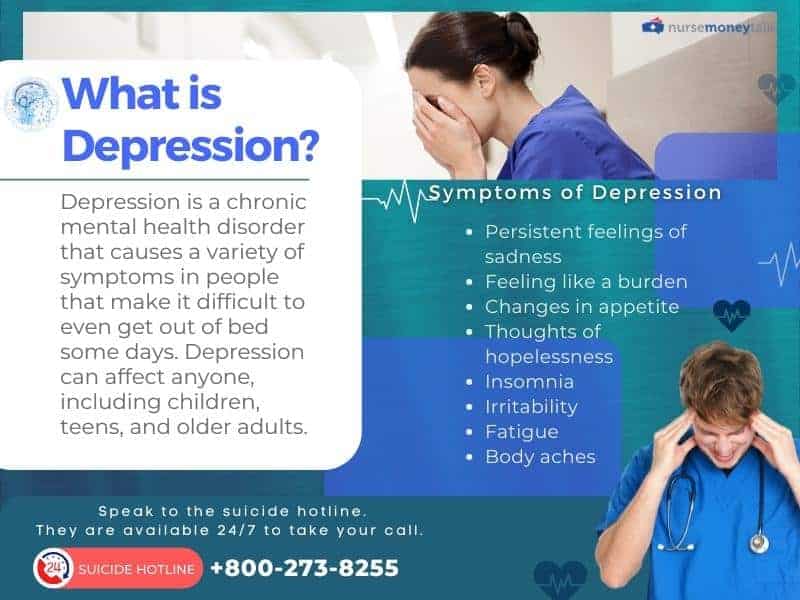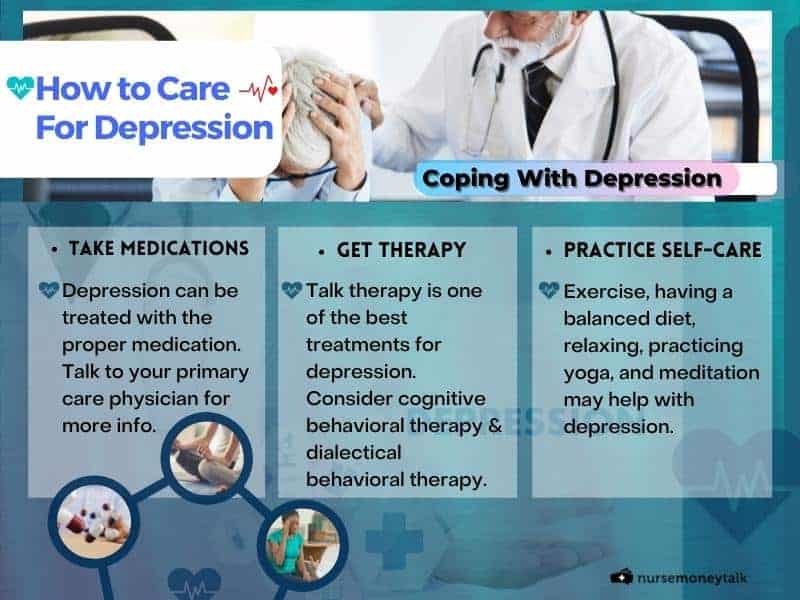Living with depression is a reality for many Americans.
Approximately 17 million Americans live with the condition, which makes you wonder, how do so many Americans get by and find the energy to work and live life?
Would it be possible to have a successful career and live with depression at the same time?
*Disclosure: This article on can you become a nurse with depression may contain affiliate links. If you click and make a purchase, I may receive a commission. For more info, please see my disclaimer.
Can You Become a Nurse with Depression?
Yes, you can become a nurse even if you have depression or any other mental health issues as long as your symptoms are managed. Many people with depression can still find a way to succeed in any career, including nursing.
Find Nursing Programs
Search our school database to find schools and get information on the right programs for you. (Don’t worry, it’s fast and free!)
What is Depression?

Depression is a chronic mental health disorder that causes various symptoms that make it difficult to even get out of bed some days.
Depression is a mental illness that can affect anyone, including children, teens, and older adults.
Symptoms of depression, known as Major Depressive Disorder or MDD, can include:
- Persistent feelings of sadness
- Irritability
- fatigue
- Insomnia
- Thoughts of hopelessness
- Feeling like a burden
- Changes in appetite
- Body aches
The most severe symptoms of depression include self-harm and thoughts of suicide.
Seek Help If Needed!
If you or someone you know has depression and suicidal thoughts, it’s incredibly important to take the initiative and seek help immediately.
You can call your local emergency line, such as 9-1-1, or speak to the suicide hotline at 800-273-8255. They are available 24/7 to take your call.
Do Nurses Have Depression?
A major recent survey conducted by the American Nurses Foundation found that almost 30% of nurses said they were experiencing depression.
Although alarming due to the high rate and its findings, this study does teach us that it’s possible to live and work as a nurse with depression.
However, just because a nurse can work with depression doesn’t mean it’s healthy to put self-care and ignore your symptoms of depression.
Coping With Depression and Work

If you feel your symptoms of depression are getting worse and are negatively impacting your ability to do your job, it’s important to take time off to recover and get help for your depression.
The Family and Medical Leave Act allows you to take time off work for any medical or mental health condition without fear of being fired or reprimanded.
Taking FMLA leave is an excellent way to begin to treat your depression and return to work fully able to take care of your patients.
Some of the best ways to work successfully as a nurse and care for depression include:
Taking Medications
Many people with depression can be treated using the right medication, known as antidepressants or SSRIs.
These medications do have side effects, such as making someone sleepy. If this is the case, it’s important to talk to your doctor about how to combat this or make changes to your medication otherwise.
If you’ve been struggling with depression, medication might be a great solution so you can enhance your mood and continue doing what you love – working as a nurse.
Getting Therapy
Unfortunately, the prevalence of nurses with depression and anxiety is at an all-time high due to recent world stressors.
From dealing with a pandemic to being exposed to daily trauma and violence, it can be difficult to avoid feeling depressed and anxious as a nurse.
Fortunately, help is available to get through the worst times that arise. By visiting a therapist, you can be better able to handle life’s stressors in addition to being better prepared to work as a nurse.
Talk therapy is one of the best treatments for depression, in addition to other forms of treatment such as cognitive-behavioral therapy and dialectical behavioral therapy.
Practice Self Care
It’s essential to have compassion for yourself and remember to take time off to rest and recharge.
Studies have shown that self-care methods are effective at treating both anxiety and depression.
These methods include exercising, having a balanced diet, relaxing and practicing other techniques such as yoga and meditation.
Whether that’s lounging in front of the TV on your off day, or picking up a hobby, don’t forget to practice self-care so you can keep your depression at bay.
Will I Be Denied a Nursing Job Because Of My Depression?

You might be denied a nursing position if you cannot obtain an RN license from your state board.
Keep in mind that your state can ask you for a copy of your psychiatric records to determine if you’re able to practice safely as a nurse.
Because you’re dealing with lives at hand, you must be able to prove your ability to work as a nurse despite your depression or other mental illness.
Fortunately, by taking the time to recover, go to therapy, take your medications, and practice other techniques, you can prove that you are, in fact, able to work as an RN and provide care to your patients.
Just because your state board asks for your mental health history does not mean they will deny you a license for having depression!
There is Hope For Your Nursing Career
When you’re living with depression, it can be difficult to imagine that there can be hope in your life or that you can make your dreams a reality by working as a nurse.
Fortunately, there are many nurses and people who live with depression and can still make their lives and careers blossom!
If you’re thinking about getting started with your nursing career, don’t let your depression hold you back. Take charge, and check out our website for your next nursing job or to find a nursing program!
Find Nursing Programs
Search our school database to find schools and get information on the right programs for you. (Don’t worry, it’s fast and free!)
Have You Read These Yet?
- Can You Become a Nurse with One Eye?
- Can You Become a Nurse if You Have Schizophrenia?
- Can Felons Become a Nurse?
- Do You Have to Become an LPN Before Becoming an RN?

